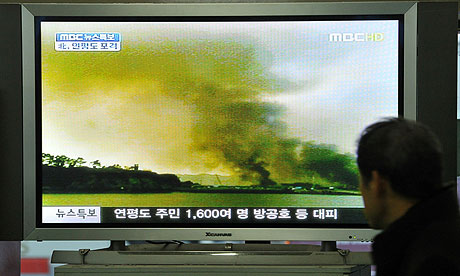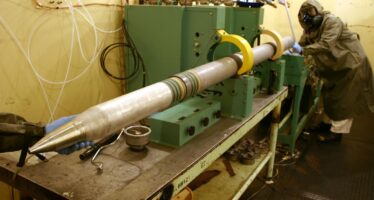North Korea may be hiding more nuclear sites, US tells watchdog
![]()
IAEA expresses ‘great concern’ over reports of new North Korean uranium enrichment facility

The head of the UN nuclear watchdog has voiced deep concern about North Korea’s expanded nuclear programme, as Washington warned that the secretive state may be hiding even more atomic sites.
North Korea boasted about its nuclear advances this week, saying it was operating a uranium enrichment plant with thousands of centrifuges. Centrifuges are devices that spin at supersonic speed and refine uranium so that it can serve as fuel for nuclear power plants or, if refined to a much higher degree, for atomic bombs. If confirmed, such a facility could offer it a second pathway to making a nuclear bomb.
“These developments … are a clear manifestation of the risks posed by North Korea’s defiance of its international obligations and commitments,” the US envoy Glyn Davies told an International Atomic Energy Agency (IAEA) meeting in Vienna.
He said in a speech to the IAEA’s 35-nation governing board that it was likely Pyongyang had been pursuing enrichment capability before April 2009, the date it most recently claimed.
“If so, there is a clear likelihood that [it] has built other uranium enrichment-related facilities in its territory,” Davies said.
The IAEA director general, Yukiya Amano, expressed “great concern” about reports of the new uranium enrichment facility and construction of a light water reactor in North Korea.
Details about North Korea’s uranium enrichment activities surfaced last month in a report by a US nuclear scientist who had been invited to the country. He said he had seen hundreds of centrifuges and had been told there were more, which the North Koreans said were operating.
North Korea said its enrichment work was aimed at atomic power production, but it already has a plutonium-based nuclear device and carried out two nuclear test explosions in 2006 and 2009. So far it has not shown that it has a working, deliverable nuclear bomb.
The country has refused full IAEA oversight since 2002 and expelled inspectors last year, leaving the Vienna-based agency with little means to assess its latest nuclear claims or to pressure it into opening up its work to UN monitoring.
The nuclear revelations compounded tensions on the Korean peninsula which have been running high since Pyongyang fired an artillery barrage at a South Korean island, Yeonpyeong, killing four people.
At the IAEA meeting, the European Union urged North Korea to halt construction work on its nuclear facilities and to “refrain from taking any further actions that would increase tensions in the region.”
Some analysts say the attack was Pyongyang’s attempt to force the resumption of international negotiations that could bring it aid. Others saw it as an attempt to boost the military credentials of the country’s leader-in-waiting, Kim Jong-un, the youngest son of ailing leader Kim Jong-il.
Six-party talks aimed at stopping North Korea’s nuclear programme were suspended in December 2008 after Pyongyang walked out.
Related Articles
OPCW confirms Sarin exposure during the explosion that took place in Idlib
![]()
The explosion that took place in Idlib last April 4th has been followed 48 hours later by a missiles strike of United States, with 59 Tomahawk missiles sent to the Syrian aerial base
Mexico drug wars have killed 35,000 people in four years
![]()
Report reveals the human cost of gangs’ narcotic trade since Calderón declared war in 2006Haroon Siddique and agencies Tonnes of
Profiting off war: A look into the world of Israeli arms dealing
![]()
War in Israel has become a constant source of profit, with the West Bank and Gaza Strip used as experimental



